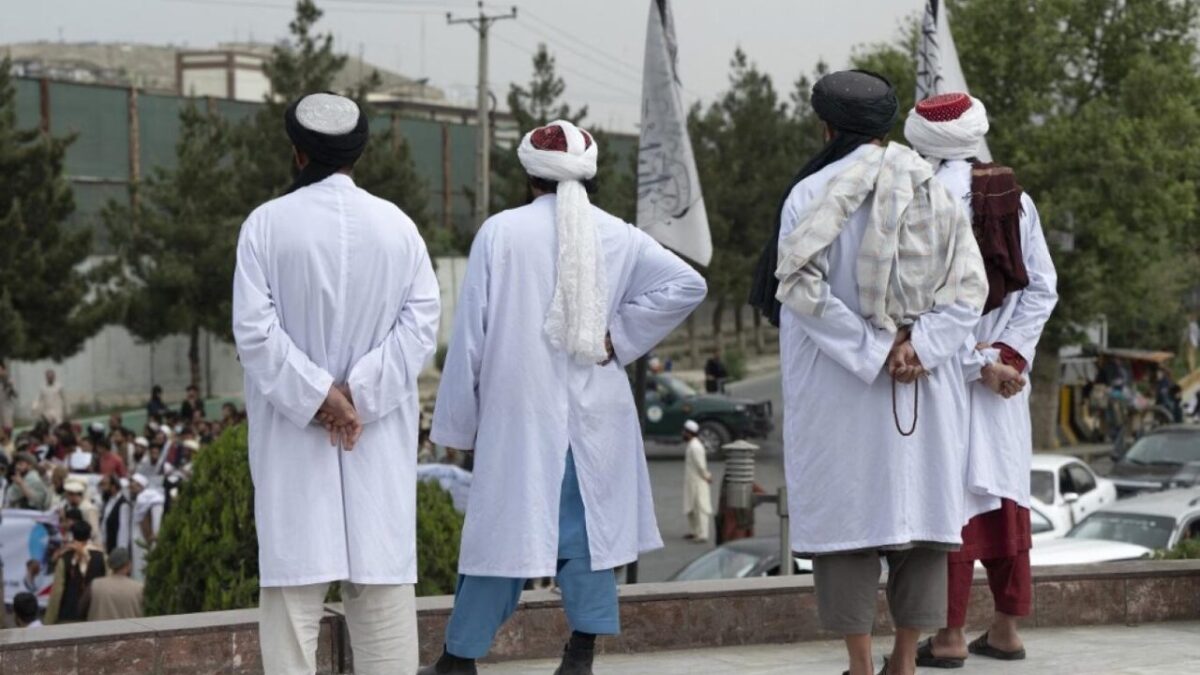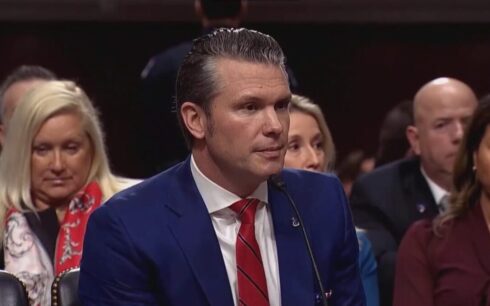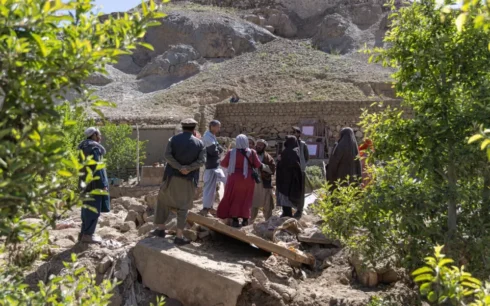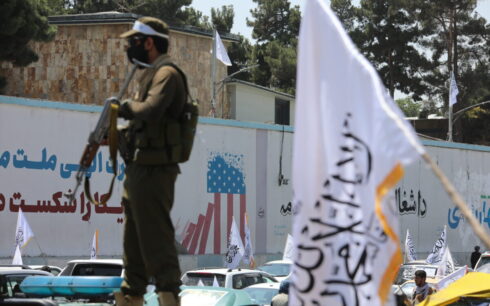A new United Nations report evaluating the Taliban’s Ministry for the Propagation of Virtue and Prevention of Vice (MPVPV) from August 15, 2021, to March 31, 2024, has documented 1,033 instances where the Taliban used force to implement their directives. These actions resulted in violations of personal liberty and physical and mental integrity, the report says.
The ministry was established by the Taliban on September 7, 2021, in a compound previously used by the Women’s Affairs Ministry in Kabul. Since its inception, the ministry has imposed numerous restrictions, particularly on women, interfering with their public and private lives, the report says.
Work Restrictions
The UN report highlights the prohibition of women’s beauty salons, women appearing in movies, and the arbitrary closure of women-led businesses, severely limiting women’s right to work and maintain an adequate standard of living.
The report says that these measures have forced many women out of the workforce, exacerbating poverty and reducing economic opportunities for families relying on women’s income.
The report says that the closure of these businesses not only affects the owners but also their employees and the wider community that depended on these services. In December 2022, women-run bakeries in Kabul received verbal orders to close, but some continued operating despite the orders.
Additionally, the women’s market floor in a Kandahar shopping center was closed, impacting numerous women shopkeepers and customers, the report says.
Travel Restrictions
The UN report notes that women are required to travel with a mahram (male guardian) for distances beyond 78 kilometers from their homes, severely restricting their freedom of movement and access to employment and healthcare.
The report also notes that in some cases, this requirement was enforced for shorter distances, contradicting the official directive. This restriction creates significant financial and logistical barriers, particularly for women in remote areas who need to travel long distances to access medical care or job opportunities.
Instances were documented where women without a mahram or without their consent were unable to access medical facilities, commute to their jobs, or travel for any reason, the report says.
Recreational Restrictions
The UN report states that women are banned from parks, gyms, and public baths, impacting their physical and mental health. Public baths are often the only way for women to access hot water for bathing in winter. These bans superseded earlier instructions that allowed men and women to use parks on different days.
The lack of access to recreational facilities further isolates women and limits their opportunities for social interaction and physical exercise, which are crucial for overall well-being. On November 9, 2022, the Taliban MPVPV announced that women could no longer use parks, gyms, and public baths, citing non-adherence to the hijab directive.
Contraception Access
According to the UN report, contradictory instructions have been issued regarding access to contraception, with some areas experiencing temporary bans. In Balkh and Maidan Wardak provinces, local health centers were verbally instructed not to provide birth control to women between February and March 2023. This restriction was later lifted, but such inconsistencies have led to confusion and restricted access.
The report notes that these restrictions have had a detrimental impact on women’s reproductive health and autonomy. Despite public statements from the Taliban-run Ministry of Public Health that there were no restrictions on contraception, local enforcement varied, causing disruptions in access.
Mandate of Taliban’s Vice and Virtue Ministry
On November 8, 2023, a decree on the Law on Complaints Hearing was approved, defining the ministry’s complaints hearing function and procedure, according to the UN report. Two manuals issued in 2023 guide MPVPV staff on conducting their work.
According to the report, a decree on the Law on Propagation of Virtue and Prevention of Vice, reportedly approved by the Taliban leader in early 2024, further outlines the ministry’s responsibilities. However, these guidelines often lack clarity and consistency, leading to arbitrary enforcement and abuse of power.
Media Restrictions
One of the first restrictions imposed by the Taliban’s vice and virtue ministry was a prohibition on women appearing in movies and on air as presenters or callers in certain provinces, the UN report states. Women journalists are required to wear the Islamic hijab, and the broadcasting of movies against Sharia principles is forbidden. In Kunar province, radio stations were instructed not to feature women callers or use female presenters on air.
These restrictions have severely curtailed freedom of expression and have disproportionately affected women working in the media. The Taliban also banned the broadcasting of movies reflecting foreign cultures or containing humor considered offensive by the authorities.
Enforcement of Decrees
The UN report details that the Taliban’s enforcement methods include threats, arbitrary arrests, detentions, and excessive use of force. Women’s right to privacy has been violated through searches for prohibited items, mosque attendance records, and proof of family relationships.
During the enforcement of these instructions, people’s right to privacy was often violated. The report details instances where individuals were subjected to public humiliation and corporal punishment for perceived non-compliance with Taliban edicts. Between August 15, 2021, and March 31, 2024, the UN documented at least 1,033 instances (205 on female, 828 on male) where MPVPV employees applied force during the implementation of instructions, including threats, arbitrary arrests, excessive use of force, and ill-treatment.
Human Rights Impacts
The UN report emphasizes that the Taliban’s policies have disproportionately affected women, violating their rights to freedom of movement, work, and health. The enforcement of these policies often involves severe and arbitrary punishments, contributing to a climate of fear and intimidation.
The report emphasizes that the Taliban’s actions have exacerbated existing gender inequalities and have further marginalized women and girls in Afghan society. The prohibition of women’s access to parks, gyms, and public baths, as well as restrictions on their participation in public and economic life, significantly impacts their mental and physical health.
Regulations Concerning Men’s Appearance and Practices
According to the UN report, the ministry issued several instructions regarding the appropriate appearance of men, including prohibiting barbers from trimming beards or giving “Western style” haircuts. Men have also been instructed to observe congregational prayers at mosques, with failure to do so sometimes resulting in severe punishment, including public flogging and detention.
The report notes that these measures have been enforced with varying degrees of severity across different provinces. On January 24, 2024, in Herat province, the head of the local DPVPV instructed barbershops not to shave or trim beards shorter than the length of a fist and to avoid providing “Western hairstyles.”
Prohibition of Music and Hookah
The UN report states that the Taliban MPVPV has enforced a range of orders regulating behaviors deemed “un-Islamic,” such as music and smoking hookah. Drivers were ordered not to play music in their cars, and wedding halls were instructed to refrain from playing music during celebrations.
The prohibition of music has led to instances of violence and intimidation, as documented by the UN report. On February 27, 2022, media circulated an instruction ordering drivers not to play music in their cars. Later, on June 11, 2023, the MPVPV instructed wedding halls to refrain from playing music during weddings and other celebrations.
Prohibition on Display of Human and Animal Images
The UN report documents that the Taliban authorities have deemed human and animal images “un-Islamic” and prohibited them. This includes the removal of advertising signage, public statues, and the covering of faces of shop mannequins.
The report documents instances where businesses were forced to alter their displays to avoid punishment. Some NGOs were instructed to remove human images from materials used in awareness campaigns, including those aimed at children and people with limited literacy.
Impacts on Human Rights and Fundamental Freedoms
The UN report highlights that Afghanistan is a State party to several international human rights treaties and continues to be bound by the obligations set out in these treaties. The Taliban MPVPV’s instructions and enforcement methods have resulted in significant violations of human rights, particularly for women.
The use of corporal punishment is a violation of the prohibition on torture and cruel, inhuman, and degrading treatment or punishment.
The report emphasizes that the Taliban’s actions have created a climate of fear and intimidation, particularly affecting women’s ability to participate in public life and access basic services.
Conclusion
As Afghanistan is a State party to and is bound by several international human rights instruments, the de facto authorities are obliged to protect and promote the human rights of all people living in Afghanistan, according to the UN report. The instructions issued by the Taliban MPVPV and its provincial offices, as well as the methods used to enforce these instructions, constitute violations of various human rights and fundamental freedoms.
The report calls for the de facto authorities to ensure the equal enjoyment of human rights without discrimination. The UN report highlights the urgent need for the Taliban to align their practices with international human rights standards and to protect the rights of all Afghan citizens, particularly women and marginalized groups.
Methodology
The UN report covers the period from August 15, 2021, to March 31, 2024, and is based on monitoring and documentation of human rights violations across Afghanistan. The data includes both publicly available information and cases documented by the UNAMA Human Rights Service (HRS).
This documentation provides a detailed and alarming picture of the state of human rights under Taliban rule, emphasizing the need for international attention and intervention to protect vulnerable populations in Afghanistan, the report says.





